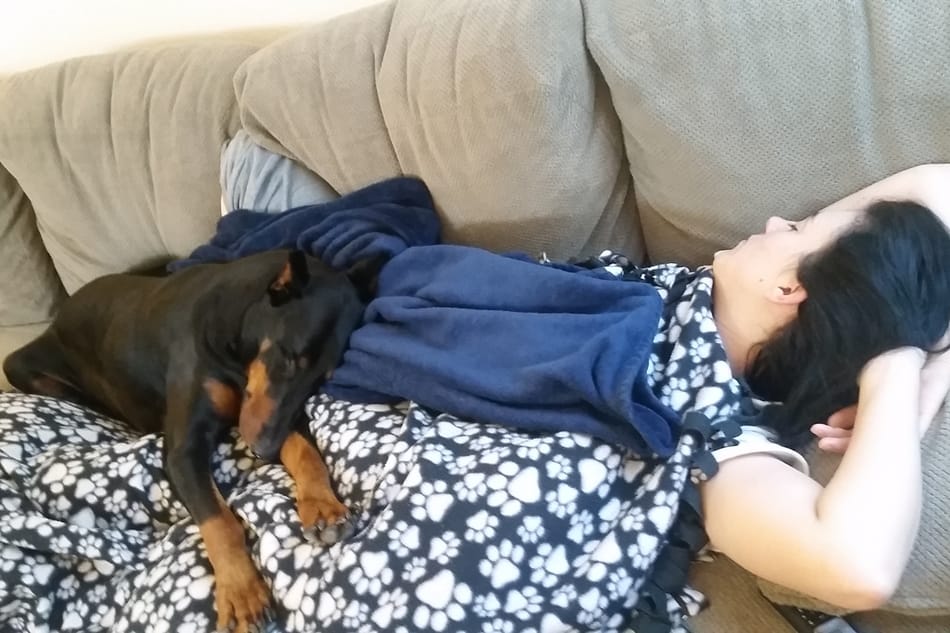Have you ever wondered why your Doberman pinscher loves to sit on you? It may seem strange, but this behavior actually has a fascinating explanation.
Doberman pinschers are known for their loyalty and affectionate nature toward their owners. When they sit on you, it’s their way of showing love and seeking comfort and security. This behavior stems from their desire to be close to their human pack leader, as they consider you as part of their family. So the next time your Doberman sits on you, embrace it as a loving gesture that reinforces the bond between you and your furry companion.
Dobermans are known for their loyalty and desire for physical closeness with their owners. If your Doberman sits on you, it may be their way of showing affection and seeking comfort. They enjoy being close to their loved ones and want to be a part of whatever you’re doing. It’s a sign of trust and a way for them to feel secure. Embrace the love and enjoy the bond you have with your Doberman!
Why Does My Doberman Sit On Me?
Dobermans are known for their loyalty and affection towards their owners. One common behavior that Dobermans exhibit is sitting on their owners. While it may seem cute and endearing, many owners wonder why their Dobermans have this behavior. In this article, we will explore the reasons behind why your Doberman sits on you and what it might signify.
Comfort and Security
Your Doberman sitting on you could be a display of comfort and security. Dogs, in general, seek out their owners for safety and reassurance. When your Doberman sits on you, it may be seeking the comfort of your presence and the security it feels being close to you. It’s a way for your Doberman to bond with you and establish a sense of trust.
This behavior may stem from their ancestral pack instincts. In the wild, dogs would huddle together for warmth and safety. By sitting on you, your Doberman is essentially recreating that pack dynamic and finding comfort in your presence.
If your Doberman sits on you when you’re feeling down or stressed, it could be its way of providing emotional support. Dogs are known for their ability to sense their owner’s emotions and react accordingly. By sitting on you, your Doberman may be offering you comfort and trying to alleviate your stress.
Attention and Connection
Another reason your Doberman might sit on you is to seek attention and strengthen the bond between you. Dogs are social animals that crave interaction and connection with their owners. By sitting on you, your Doberman is actively seeking your attention and affection.
When your Doberman sits on you, it’s a way for them to be physically close and enjoy your company. It allows them to feel connected to you and reinforces the bond you share. This behavior is often seen in Dobermans who are particularly attached to their owners and have a strong desire for their presence.
Marking Territory
Dobermans, like many other dogs, have scent glands located in their paws. When a Doberman sits on you, it may be leaving its scent behind as a way of marking you as its territory. It’s a natural instinct for dogs to mark their territory to establish ownership and boundaries.
Sitting on you allows your Doberman to leave its scent and communicate to other animals that you belong to them. This behavior is more common in unneutered male Dobermans, as they have a stronger urge to mark their territory.
Seeking Warmth
Dobermans have short coats and can be more sensitive to cold temperatures. When your Doberman sits on you, it could simply be seeking warmth. Your body heat provides a cozy and comfortable spot for them to relax.
This behavior is especially common during colder seasons or in households with cool indoor temperatures. Your Doberman may naturally gravitate towards you to keep warm and maintain a comfortable body temperature.
Dominance and Territory
In some cases, your Doberman sitting on you can be a display of dominance and a way to assert its territory. Dogs have a hierarchical nature, and some Dobermans may exhibit dominant behaviors to establish themselves as the leader.
If your Doberman frequently sits on you in an authoritative manner and shows signs of possessiveness, it’s important to establish boundaries and reinforce your role as the leader. Consult a professional dog trainer for guidance on how to address dominant behaviors in your Doberman.
Conclusion
Overall, there can be various reasons why your Doberman sits on you. It could be seeking comfort, attention, warmth, or even exhibiting dominant behaviors. Understanding these underlying reasons can help strengthen the bond between you and your Doberman. If you have any concerns about your Doberman’s behavior, it’s always best to consult with a veterinarian or a professional dog trainer for guidance.
Key Takeaways: Why Does My Doberman Sit on Me?
- 1. Your Doberman may sit on you to seek attention and affection.
- 2. Sitting on you can be a sign of dominance from your Doberman.
- 3. Your Doberman may sit on you as a way to show protection and guard you.
- 4. Sitting on you can be a behavior learned from puppyhood, seeking comfort and security.
- 5. Your Doberman may sit on you as a way to mark you with their scent and claim you as their own.
Frequently Asked Questions
Dobermans are known for their loyalty and affection towards their owners. While it may seem strange for your Doberman to sit on you, there are several reasons why they might exhibit this behavior. In this article, we will answer some frequently asked questions about why your Doberman sits on you and what it means.
1. What does it mean when my Doberman sits on me?
When your Doberman sits on you, it can be a sign of affection and a way to bond with you. Sitting on you allows them to be close to you, and it can make them feel secure and comfortable. Dogs often seek physical contact with their owners as they have a strong pack mentality and thrive on companionship. So, if your Doberman chooses to sit on you, it means they love being close to you and enjoy your company.
However, it’s essential to remember that dogs have different individual personalities, and some may be more prone to sitting on their owners than others. It can also be a habit that they have developed over time and find comforting. If your Doberman is sitting on you excessively or it becomes uncomfortable for you, it may be helpful to provide them with a comfortable alternative, such as a nearby dog bed or blanket, where they can still be close to you without invading your personal space.
2. Why does my Doberman sit on me when I’m sitting or lying down?
When your Doberman sits on you while you are sitting or lying down, it can be a sign of dominance or a way for them to assert their position in the pack hierarchy. Dogs have an intuitive understanding of social hierarchies, and by physically sitting on you, they may be expressing their dominance or trying to claim you as their territory. It’s important to establish a balanced and respectful relationship with your Doberman by setting clear boundaries and providing proper training.
If your Doberman’s sitting behavior becomes excessive or demanding, it’s essential to address it through positive reinforcement training. Encourage them to sit on their own designated spot, such as a dog bed or mat, and reward them for choosing that spot instead of sitting on you. Consistency and positive reinforcement will help redirect their behavior and establish a healthier dynamic between you and your Doberman.
3. Is it a sign of stress or anxiety when my Doberman sits on me?
While sitting on you can sometimes be a sign of stress or anxiety in dogs, it is not necessarily always the case. Dogs may seek close physical contact with their owners when they feel uncertain or anxious as a way to find reassurance and comfort. However, it’s crucial to assess their overall behavior and body language to determine if the sitting behavior is related to stress or anxiety.
If your Doberman shows other signs of stress or anxiety, such as trembling, panting, pacing, or avoiding certain situations, it’s important to address their underlying concerns. Consult with a professional dog trainer or veterinarian who can provide guidance on how to alleviate stress and anxiety in your Doberman. Training techniques, environmental changes, and possible medical interventions may be recommended to help your Doberman feel more secure and relaxed.
4. Can sitting on me be a sign of protection or possessiveness?
Sitting on you can sometimes be a way for your Doberman to show protective tendencies or a sense of possessiveness. Dogs are naturally protective of their owners and home, and by sitting on you, they may be trying to guard you from potential threats or perceived intruders. It can also be a display of possessiveness, where your Doberman wants to claim you as their own and keep others away.
If you notice this behavior in your Doberman, it’s essential to establish clear boundaries and reinforce the proper socialization and obedience training. Teaching your Doberman commands like “stay” or “off” can help them understand when it’s appropriate to sit or be near you. Encourage positive interactions with other people and animals to minimize possessive behavior and promote a balanced and friendly temperament.
5. How can I discourage my Doberman from sitting on me?
If you wish to discourage your Doberman from sitting on you, there are several steps you can take:
1. Provide an alternative: Set up a comfortable and designated spot for your Doberman, such as a dog bed or blanket, where they can relax and be close to you without sitting directly on you.
2. Use positive reinforcement: Reward your Doberman with treats, praise, and attention when they choose to sit on their designated spot instead of sitting on you. Positive reinforcement will help reinforce the desired behavior.
3. Encourage independence: Gradually encourage your Doberman to spend time on their own, engaging in independent activities or playing with toys. This will help them develop confidence and reduce their reliance on sitting on you for comfort.
4. Consistency and patience: Changing a behavior takes time and consistency. Be patient with your Doberman and remain consistent in redirecting their sitting behavior to their designated spot.
By following these steps and providing proper training and reinforcement, you can help your Doberman understand boundaries and develop appropriate sitting habits that are comfortable for both of you.

If your Doberman sits on you, it could be a sign of affection and a desire for closeness.
Dobies are known to be loyal and protective, often seeking physical contact with their owners to show their love and to mark their territory.
